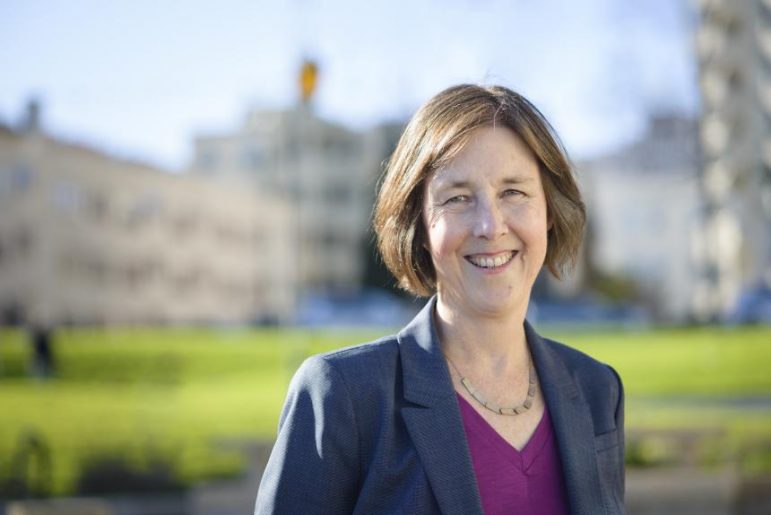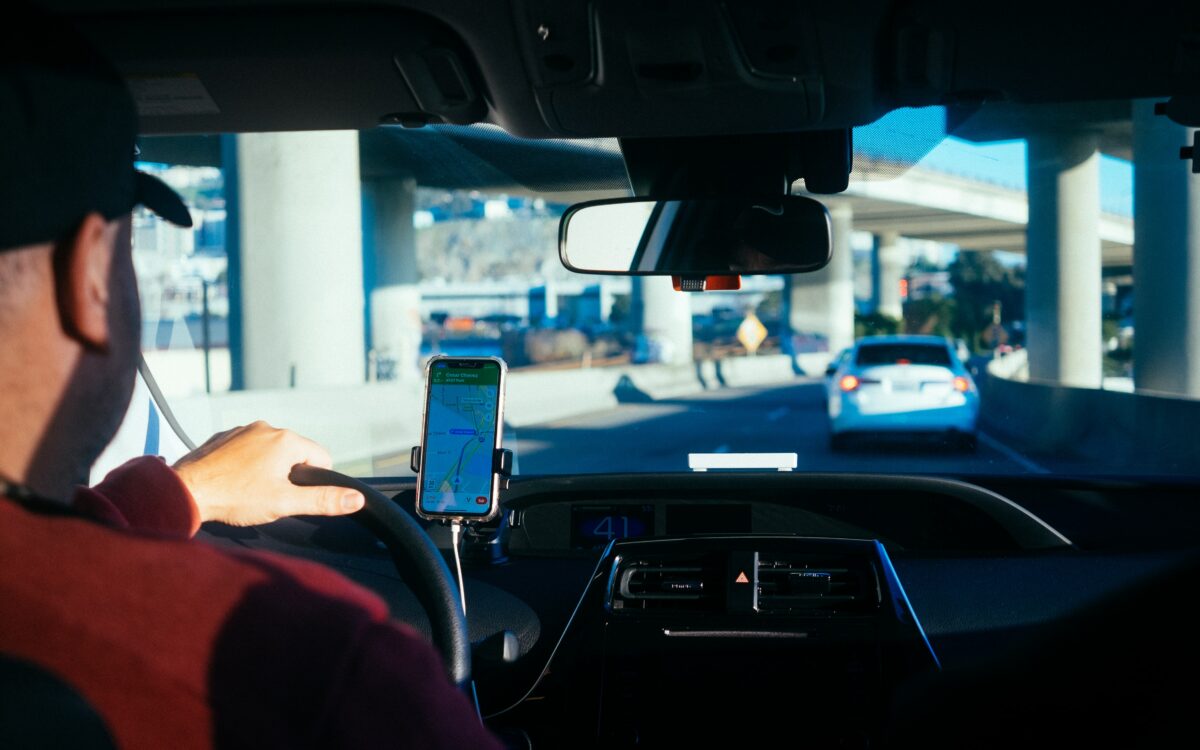Wilfred Adu-Beng was already grappling with a mountain of hardships after his father and stepmother died. Getting his younger brother — for whom he was suddenly responsible — to middle school every day proved to be one of the biggest hurdles of all.
In essence, it was impossible. Adu-Beng, a psychiatric tech at a hospital near San Bernardino, often worked swing or early morning shifts.
He lived too far from the school for his brother to take the bus. Adu-Beng feared he’d have to quit his job in order to get his brother to school.
“I didn’t know what I was going to do. Then the school said we could use (a ride-sharing service). It’s almost been too good to be true,” Adu-Beng said. “Now I can focus on work, and my brother can get to school on time. It’s been a lifesaver.”
Hundreds of school districts and child welfare agencies in California contract with private ride-sharing companies to transport foster, homeless, and some special education students — the only students districts are legally required to provide transportation for — to and from school. Districts say it’s cheaper and easier than providing bus service, considering the difficulty districts have had hiring bus drivers and the expense of maintaining buses.
The trend has been a boon for ride-sharing companies like HopSkipDrive, which last year provided 2 million rides in California and 11 other states.
When HopSkipDrive was founded nine years ago, most of its customers were busy parents who needed help getting kids to after-school activities. Now, the vast majority of the company’s clients are school districts, nonprofits and child welfare agencies.
It’s also been a boon for students. In Riverside County, the office of education paid for 420 HopSkipDrive rides for foster youth last year and saw the overall attendance rate for foster students jump from 29% to almost 80%, according to the office’s Local Control and Accountability Plan.
More than 300 such organizations contract with HopSkipDrive in California alone.

But a bill under consideration in the Legislature could dramatically alter the way businesses like HopSkipDrive operate in California. Senate Bill 88, by state Sen. Nancy Skinner, D-Berkeley, would require drivers for private ride-sharing companies to meet the same safety regulations required of school bus drivers. They’d have to undergo training to become mandated reporters, pass biannual medical exams, learn first aid, pass a tuberculosis test, and meet a dozen other requirements. And like school bus drivers, they’d have to keep daily vehicle maintenance logs, checking brakes, fluid levels, and lights every morning, among other measures.
As districts rely more and more on ride-sharing services, SB 88 is necessary to keep children as safe as they’d be if they rode a school bus, Skinner said.
“All of us should want to make sure that anyone driving kids to school meets certain safety standards,” Skinner said.
Until the late 1970s, school buses were the norm in California. But as Proposition 13 slashed school funding, most districts eliminated or greatly reduced bus service for all students except those they’re required to serve, such as foster youth. In fact, only 9% of California students take the bus to school, one of the lowest rates in the country.
Skinner has been trying to change that, noting the link between chronic absenteeism and lack of transportation to school, particularly for elementary and middle school students. Students who are chronically absent are more likely to lag academically and drop out, with Black, Latino, and low-income students disproportionately affected, according to the research group Attendance Works.
In addition, high rates of chronic absenteeism can mean less money for schools, as districts miss out on funding that’s based on their average daily attendance.
Last year, Skinner introduced a bill that would have required school districts to provide bus service. That bill died, but the state budget included more money for districts to pay for transit, including school buses, passes for local municipal buses and ride-sharing services. That was the impetus for SB 88, Skinner said.
“Now that districts have access to this increased funding, it’s only reasonable to expect they’d meet certain safety standards,” Skinner said.
But the proposed regulations imposed by SB 88 are so burdensome that the company could not continue to operate, said HopSkipDrive’s chief executive officer, Joanna McFarland. For HopSkipDrive drivers to comply with the new safety regulations, they’d have to become employees, which is not the company’s business model.
“(This bill) imposes regulations you’d place on a seven-ton school bus on a driver in their own personal vehicle,” McFarland said. “It doesn’t make any sense. And it could take away transportation options away from thousands of vulnerable students.”
HopSkipDrive drivers already meet strict safety standards, McFarland said. They must pass a background check, have a clean driving record, have a reliable car, be fingerprinted, and have at least five years’ experience as a caregiver. In addition, a navigation tracking system allows parents to monitor the driver’s route.
That’s not enough, according to the union that represents California’s 5,000 school bus drivers.
School bus drivers, who are certified by the California Highway Patrol, also must have a clean driving record and pass a background check, but they also must complete a first aid course, pass a behind-the-wheel test, obtain a special driver’s license, and meet a slew of other requirements in order to drive a school bus. Not all of these rules apply for school bus drivers using passenger vehicles to transport students.
These higher standards are imperative to ensure students’ safety, said David Schapira, government relations director for the California School Employees Association, which is a sponsor of SB 88. It’s not fair, he argued, that some drivers must meet the standards and others need not.
“We believe in student safety first and foremost,” he said. “But we believe that if a driver is being compensated by a school district, the safety standards should be applied equally whether the driver is in the public or private sector.”
SB 88 has passed out of the Assembly Public Safety Committee and been referred to the Education Committee.

More than a dozen youth advocacy groups, including the Children’s Law Center of California, had opposed SB 88, saying it would make it harder for foster youth to get to school. Foster youth already have the highest rate of chronic absenteeism in the state — 42% last year — and limiting their transportation options would only make matters worse, advocates said. However, many of those groups have withdrawn their opposition following the introduction of new amendments to the bill, including changes that would address exceptions for emergency situations and removal of the cannabis component of the drug testing requirement.
“Placement instability is an unfortunate reality for many youth in foster care,” the groups wrote in their opposition letter to Assemblymember Al Muratsuchi, chair of the Assembly Education Committee. “We are very concerned with the potential negative impact that SB 88 will have on a (school district’s) ability to craft transportation plans that will meet the individualized needs of youth in care across the state. … SB 88, as written, will cause school instability and limit access to school of origin for youth in foster care and other marginalized students.”
Yesenia Vera, a preschool teacher from Apple Valley who drove for HopSkipDrive for about a month, said the experience was nerve-wracking. She felt unprepared to care for students with behavioral challenges and worried continuously about their safety.
In one instance, she drove a girl who was prone to unbuckling her seatbelt, opening car doors, and hated the freeway. So Vera drove her 30 miles on side streets, terrified the entire ride the girl would jump out of the moving car. The ride took well over an hour, making her late to pick up her own kids.
“It was the most stressful thing I’ve ever done in my life,” Vera said. “Even though I’m a teacher, I don’t have the tools, the knowledge, the experience to handle a girl like that. It was incredibly unsafe. Never again.”
McFarland said that HopSkipDrive has a nearly impeccable safety record, and drivers do receive instructions on how to handle students with behavioral challenges. “Every facet of our business is built on safety,” she said.
In Los Angeles, Precious Aryee said she could not have managed her cousin’s schooling without HopSkipDrive. When the 15-year-old moved in with Aryee, the pair moved to a bigger apartment in Inglewood, a few miles farther away from the teen’s high school in Gardena. The logistics of getting the girl to school on time and getting herself to work proved overwhelming for Aryee: The girl was tardy more than 50 times.
“It was getting to be a bad habit, and I didn’t want to send that message. I didn’t want that spilling over into other aspects of her life,” Aryee said. “I want her to know that school is important.”
Because the girl is in the foster system, she qualified for free rides to and from school through HopSkipDrive. That changed everything, Aryee said. With the stability and reduced stress, the girl is doing better in school, and Aryee doesn’t have to worry about being late to her own job.
“It’s been invaluable. We seriously rely on it,” she said. “If HopSkipDrive went out of business, it would be devastating for families who need it.”
Skinner points out that SB 88 does not prevent school districts from contracting with ride-sharing services, and meeting additional safety requirements should not pose a serious obstacle for companies.
For Adu-Beng, life has become smoother without the stress of getting his younger brother to school. The boy, who has struggled with behavioral issues and seizures, has improved his academics and recently graduated from eighth grade.
“For a while he didn’t even have a 2.0,” Adu-Beng said. “Now he’s helping his teachers, helping around the house. He’s doing great. Things have been getting progressively better, and we are so grateful.”
EdSource reporting intern Cara Nixon contributed to this story.
